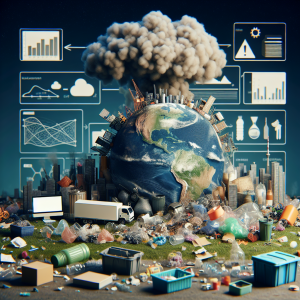Economic Advantages of Recycling
Recycling offers substantial economic benefits by reducing costs associated with waste disposal and extending the lifecycle of materials. By transforming waste into reusable resources, recycling minimizes the demand for raw materials, which are often more expensive to extract and process. The job creation potential in the recycling industry is noteworthy, providing employment opportunities in collection, sorting, and processing facilities. According to the U.S. Environmental Protection Agency, the recycling and reuse industry supports thousands of jobs and generates billions in economic activity annually. Moreover, the development of innovative recycling technologies continues to stimulate economic growth, as businesses and governments invest in infrastructure to streamline recycling processes.
Energy Conservation
The recycling process is a significant energy saver. Manufacturing products from recycled materials generally requires less energy than producing them from virgin raw materials. For instance, recycling aluminum can save up to 95% of the energy needed to create new aluminum from bauxite ore. Similarly, recycling paper saves approximately 60% of the energy compared to producing it from fresh pulp. The energy savings are linked to various factors, such as reduced extraction, processing, and transportation of raw materials. This reduction in energy demand leads to decreased carbon emissions, making recycling a crucial tool in combating climate change.
Reducing Landfill Use
One of the most immediate environmental benefits of recycling is the reduction in landfill utilization. Landfills are not only eyesores but also significant sources of pollution. They release methane, a potent greenhouse gas, and can contaminate soil and groundwater with hazardous substances. By diverting waste away from landfills, recycling helps mitigate these environmental hazards. Landfill space is limited and expensive, so reducing the volume of waste deposited extends the usable life of these sites and saves on construction and maintenance costs for new facilities.
Pollution Reduction
Recycling plays a critical role in mitigating pollution. The process of transforming waste products into reusable materials results in fewer pollutants compared to conventional manufacturing. For example, the production of paper from recycled materials produces significantly less air and water pollution than using raw pulp. Recycled metals also result in less water and air contamination during the refining process. Furthermore, recycling plastic helps prevent the leaching of toxins into the environment that would otherwise occur in landfills or open burning, contributing to improved air and water quality.
Conservation of Natural Resources
Recycling is essential in conserving natural resources. By reprocessing materials like paper, plastic, glass, and metal, recycling reduces the need to exploit virgin resources. This conservation is vital not only for preserving biodiversity but also for maintaining ecosystems. Trees, minerals, oil, and other natural resources have intrinsic ecological value and their extraction often leads to deforestation, habitat destruction, and landscape alteration. Through recycling, we help sustain natural reserves for future generations, promoting a more responsible and conscious use of the Earth’s resources.
Recycling Challenges and Innovations
Despite its benefits, recycling is not without challenges. One of the primary issues is contamination, which can significantly reduce the efficiency of recycling operations. Mixed materials and non-recyclables collected together can diminish the quality of the recycled output. Additionally, the fluctuating global market for recyclables can impact the economic viability of recycling programs. However, innovations in recycling technologies are addressing these challenges. Breakthroughs in AI and machine learning are improving sorting efficiency, while chemical recycling methods are expanding the scope of materials that can be recycled. These innovations promise to enhance the sustainability and effectiveness of recycling on a global scale.
Role of Policy and Education
Government policies and public education are pivotal to the success of recycling initiatives. Regulations that mandate recycling and ban certain materials from landfills encourage compliance and participation. Furthermore, incentives such as tax breaks and grants for recycling facilities promote investment in this sector. Public education campaigns also play a crucial role by raising awareness about the environmental impact of waste and instructing individuals and businesses on proper recycling methods. By becoming more informed, communities can contribute to higher recycling rates and improved waste management practices.
Contribution to Sustainable Development
Recycling is integral to advancing sustainable development goals. By promoting resource efficiency and minimizing waste, recycling contributes to the creation of sustainable cities and communities. It aligns with global efforts to combat climate change by reducing the carbon footprint of waste disposal and the manufacturing industry. Furthermore, recycling supports a circular economy, where materials are continuously reused, creating a more sustainable model for consumption and production. This approach not only mitigates environmental impact but also fosters economic resilience and social equity.
Case Studies and Examples
Numerous case studies illustrate the positive impact of recycling. For example, Sweden’s waste-to-energy programs and recycling initiatives have resulted in less than 1% of the country’s household waste going to landfills. The country’s model has demonstrated effective resource recovery and energy generation from waste, setting a benchmark for others. Similarly, San Francisco has implemented ambitious recycling and composting programs, achieving a diversion rate of over 80% of its waste from landfills. These examples underscore the potential of well-structured recycling programs to dramatically reduce environmental impact.
Future of Recycling
The future of recycling holds promising potential with advancements in technology and renewability strategies. As society progresses towards more sustainable living, the integration of smart technologies and IoT in waste management is set to enhance the effectiveness of recycling efforts. The development of bioplastics and other sustainable materials will further decrease dependency on non-renewable resources. Global cooperation and a collective commitment to developing comprehensive recycling systems will be key in tackling the environmental challenges of waste, ultimately leading to a cleaner and more sustainable planet.



